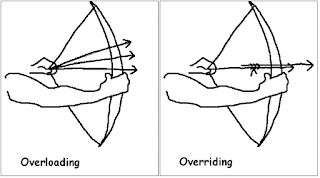We have came across many methods so far, for example, the famous main method looks like the following:
public static void main(String...args) {System.out.println("hello");}
- public is the access modifier, other modifiers are protected, default (no modifier) and private.
- static is an optional specifier, other optional specifiers are abstract, final, synchronized (non OCA), native (non OCA) and strictfp (non OCA).
- void is the return type, return type could be void (means nothing is returned), primitive type, or object.
- main is the method name, method name is an java identifier, it can only contains alphabetics, $ and _, the first character can not be a number, reserved word is not allowed.
- String...args are method parameter list. Parameter list is a comma separated method parameters, the parameter list can have zero or multiple parameters. String...args defines an Varagrgs, you can pass in an array or a list of strings or nothing at all as method parameters. An vararg parameter must be the last element in a method's parameter list.
- Optionally, a method can have exception list, the caller of the method have to catch the exceptions or throw them.
- {} is the method body, it is not optional.
OCAJP>cat test.java
class test{
public static void main(String... args) {
try{
System.out.println(getString("a", 2, "b","...c"));
} catch(Exception o) {}
}
private static final synchronized String getString(String a, int b, String...bs) throws NullPointerException,IllegalArgumentException {
String tmp = a + b;
for(String i: bs)
tmp+=i;
return tmp;
}
}
OCAJP>javac test.java
OCAJP>java test
a2b...c
For OCAJP test, we have to be aware of what method declarations don't work, and quickly select the do not compile option.
OCAJP>cat test.java
class test{
public static void main(String... args) {
test t = new test();
t.right(1, new int[] {0}, new int[] {2});
//t.right(1, {0}, 1, 2, 3); //not compile
t.right(1, new int[] {}, new int[]{1,2}); //pass in an array
t.right(1, new int[] {}, 1, 2); //pass in some number of int parameters
t.right(1, new int[] {}); //pass in an empty array
t.right(1, null, null); //pass in null
//t.right(1, 2, 3, 4); //error: incompatible types: int cannot be converted to int[]
}
//private void m1 {} //error: '(' expected
public void method() {return;}
//public void method1() {return null;} //error: incompatible types: unexpected return value
//public int method2() {return 1L;} //error: incompatible types: possible lossy conversion from long to int
//String m(){} //error: missing return statement
//default access modifier is ommit the access modifier, default is not a keyword
static final synchronized void m() {}
//default String m2() {} //error: modifier default not allowed here
//optional specifiers can not appear between return type and method name
//public void final m3() {} //error: <identifier> expected
void $_235() {}
//String met-8() {return "";} //- is not allowed
int certain(String a) { if(a=="something") return 1; else return 0;}
//int uncertain(String a) { if(a=="something") return 1;} //error: missing return statement
//int wrong() {return 3L;} //error: incompatible types: possible lossy conversion from long to int
//public void wrong(); //error: missing method body, or declare abstract
public void right(int a, int[] b, int...args) {}
public void right1(int a, int[] b, int[] c, String[] d, int...args) {} //ok to have arrays multiple arrays
//public void wrong(int a, int... b, int...args) {} //varargs have to be the last one in parameter list, only one is allowed
}
OCAJP>javac test.java
OCAJP>java test
Methods in the same class can have the same name but different type parameters, when this happen, we call it method overloading.
OCAJP>cat test.java
class test{
public static void main(String... args) {
test t = new test();
t.m1();
t.m1(1);
System.out.println(t.m1("xxx"));
t.m1(1,2,3,4,5,6,7,8);
t.m1(1, new int[]{});
}
void m1() {}
//String m1() {} //error: method m1() is already defined in class test
void m1(int a){}
public final String m1(String c) {return c;}
void m1(int a, int b, int...c){};
//void m1(int a, int b, int[] c){}; //error: cannot declare both m1(int,int,int[]) and m1(int,int,int...) in test
void m1(int a, int[] b){};
}
OCAJP>javac test.java
OCAJP>java test
xxx


No comments:
Post a Comment